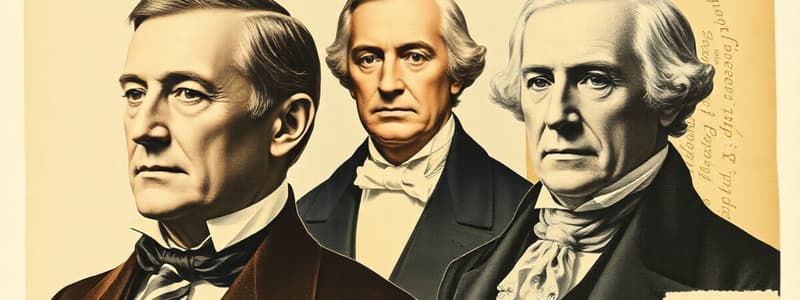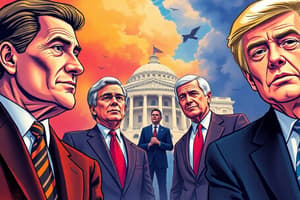Podcast
Questions and Answers
What was a significant issue that led to the formation of political parties in the 1790s?
What was a significant issue that led to the formation of political parties in the 1790s?
- Conflicts over taxation policies
- Differing views on government power structure (correct)
- Disagreements over treaties with Native Americans
- Debates over territorial expansion
Which leader was associated with the Federalist Party?
Which leader was associated with the Federalist Party?
- James Madison
- Alexander Hamilton (correct)
- John Adams
- Thomas Jefferson
What challenge did George Washington face regarding the national debt?
What challenge did George Washington face regarding the national debt?
- Establishing a national currency
- Forgiving international loans
- Eliminating all state debts immediately
- Implementing Hamilton's economic plan (correct)
What precedent did Washington set regarding presidential terms?
What precedent did Washington set regarding presidential terms?
What was one of the core values of the Federalist Party?
What was one of the core values of the Federalist Party?
What position did the Democratic-Republicans take regarding foreign alliances?
What position did the Democratic-Republicans take regarding foreign alliances?
How did Washington address the Whiskey Rebellion?
How did Washington address the Whiskey Rebellion?
What economic policy did Hamilton advocate for to support the Federalist agenda?
What economic policy did Hamilton advocate for to support the Federalist agenda?
What was a key reason Congress decided to increase military spending after the approval of Jay’s Treaty?
What was a key reason Congress decided to increase military spending after the approval of Jay’s Treaty?
What was the main outcome of the Marbury v. Madison case?
What was the main outcome of the Marbury v. Madison case?
Why did Jefferson oppose Alexander Hamilton’s financial plan?
Why did Jefferson oppose Alexander Hamilton’s financial plan?
What was Washington's stance on foreign affairs during his presidency?
What was Washington's stance on foreign affairs during his presidency?
How did the federal government respond to the Whiskey Rebellion?
How did the federal government respond to the Whiskey Rebellion?
What effect did the Alien and Sedition Acts have on John Adams's political career?
What effect did the Alien and Sedition Acts have on John Adams's political career?
Why did the US feel insulted by the XYZ Affair?
Why did the US feel insulted by the XYZ Affair?
What created uncertainty regarding Jefferson's Louisiana Purchase?
What created uncertainty regarding Jefferson's Louisiana Purchase?
What was one result of the War of 1812?
What was one result of the War of 1812?
How did the War of 1812 impact Native American resistance?
How did the War of 1812 impact Native American resistance?
Which president's administration faced issues related to impressment of sailors and trade restrictions?
Which president's administration faced issues related to impressment of sailors and trade restrictions?
What was the primary goal of Alexander Hamilton's financial plan?
What was the primary goal of Alexander Hamilton's financial plan?
What characteristic defined the Democratic-Republicans' political philosophy?
What characteristic defined the Democratic-Republicans' political philosophy?
What was one of the lasting impacts of the War of 1812 on American politics?
What was one of the lasting impacts of the War of 1812 on American politics?
What outcome did the Gibbons v. Ogden case primarily achieve?
What outcome did the Gibbons v. Ogden case primarily achieve?
What was a significant effect of the Missouri Compromise?
What was a significant effect of the Missouri Compromise?
How did the Monroe Doctrine influence U.S. foreign policy?
How did the Monroe Doctrine influence U.S. foreign policy?
Which event primarily demonstrated the conflict between federal authority and state rights during Jackson's presidency?
Which event primarily demonstrated the conflict between federal authority and state rights during Jackson's presidency?
What was a key feature of Jackson's 'common man' philosophy during his first term?
What was a key feature of Jackson's 'common man' philosophy during his first term?
What was the main reason Jackson vetoed the recharter of the Bank of the United States?
What was the main reason Jackson vetoed the recharter of the Bank of the United States?
What was one of the negative consequences of the Indian Removal Act?
What was one of the negative consequences of the Indian Removal Act?
What significant political development emerged in opposition to Jackson's perceived executive overreach?
What significant political development emerged in opposition to Jackson's perceived executive overreach?
Flashcards
What caused the formation of political parties in the 1790s?
What caused the formation of political parties in the 1790s?
The differing views on how the government should be structured led to the formation of political parties in the 1790s.
What were the core values of the Federalist Party?
What were the core values of the Federalist Party?
The Federalists believed in a strong central government, promoting industry and commerce, a loose interpretation of the Constitution, and a pro-British stance in foreign affairs. They also advocated for a national bank and tariffs.
What were the core values of the Democratic-Republican Party?
What were the core values of the Democratic-Republican Party?
The Democratic-Republicans, on the other hand, valued states' rights, supported farmers and agriculture, a strict interpretation of the Constitution, and an alliance with France. They opposed a national bank and tariffs.
What were George Washington's challenges as the first president?
What were George Washington's challenges as the first president?
Signup and view all the flashcards
How did Washington address the need for a functioning government?
How did Washington address the need for a functioning government?
Signup and view all the flashcards
How did Washington address the national debt?
How did Washington address the national debt?
Signup and view all the flashcards
What was Washington's foreign policy stance?
What was Washington's foreign policy stance?
Signup and view all the flashcards
How did Washington handle the Whiskey Rebellion?
How did Washington handle the Whiskey Rebellion?
Signup and view all the flashcards
Gibbons v. Ogden
Gibbons v. Ogden
Signup and view all the flashcards
McCulloch v. Maryland
McCulloch v. Maryland
Signup and view all the flashcards
Indian Removal Act
Indian Removal Act
Signup and view all the flashcards
Trail of Tears
Trail of Tears
Signup and view all the flashcards
Spoils System
Spoils System
Signup and view all the flashcards
Nullification Crisis
Nullification Crisis
Signup and view all the flashcards
Bank of U.S. Issue
Bank of U.S. Issue
Signup and view all the flashcards
Formation of the Whig Party
Formation of the Whig Party
Signup and view all the flashcards
Judicial Review
Judicial Review
Signup and view all the flashcards
Hamilton's Financial Plan
Hamilton's Financial Plan
Signup and view all the flashcards
Jefferson's Opposition to the National Bank
Jefferson's Opposition to the National Bank
Signup and view all the flashcards
Washington's Neutrality Policy
Washington's Neutrality Policy
Signup and view all the flashcards
Whiskey Rebellion
Whiskey Rebellion
Signup and view all the flashcards
Alien and Sedition Acts
Alien and Sedition Acts
Signup and view all the flashcards
XYZ Affair
XYZ Affair
Signup and view all the flashcards
Louisiana Purchase
Louisiana Purchase
Signup and view all the flashcards
War of 1812
War of 1812
Signup and view all the flashcards
Treaty of Ghent
Treaty of Ghent
Signup and view all the flashcards
Era of Good Feelings
Era of Good Feelings
Signup and view all the flashcards
Why the Era of Good Feelings
Why the Era of Good Feelings
Signup and view all the flashcards
Why the Era of Good Feelings Wasn't Really So Good
Why the Era of Good Feelings Wasn't Really So Good
Signup and view all the flashcards
Democratic-Republicans' Core Values
Democratic-Republicans' Core Values
Signup and view all the flashcards
Congress' Decision to Spend on the Military
Congress' Decision to Spend on the Military
Signup and view all the flashcards
Study Notes
The First Four Presidents
- Political parties formed in the 1790s due to differing views on government structure and power.
- Federalists (Hamilton): Strong central government, pro-British trade, loose interpretation of Constitution.
- Democratic-Republicans (Jefferson): Limited central government, pro-French, strict interpretation of Constitution.
- Challenges faced by Washington: establishing executive departments, managing national debt, maintaining neutrality in foreign conflicts, and suppressing domestic rebellions. He set precedents for future presidents, including a two-term limit and peaceful transfer of power.
- Hamilton's financial plan: assumed state debts, created a national bank, and imposed tariffs. It aimed to stabilize the US economy, but sparked political division.
- Jefferson opposed Hamilton's national bank because he believed it was unconstitutional and concentrated too much power in the federal government.
- Washington favored neutrality in foreign affairs to avoid entanglement in European conflicts and prevent further debt.
- The Whiskey Rebellion was suppressed by the federal government to demonstrate its authority to enforce laws.
- The Alien and Sedition Acts hurt John Adams's political career. They were seen as an abuse of power, restricting civil liberties, and targeting political opponents.
- The XYZ Affair, where French agents demanded bribes, insulted U.S. sovereignty.
- The Louisiana Purchase caused uncertainty because the Constitution didn't explicitly grant the president the power to acquire territory. Jefferson justified it under the treaty-making power.
- Conflicts with Britain evolved over time, from disputes over forts and ship seizures to impressment and interference with trade.
- The War of 1812 increased national pride, weakened Native American resistance, and fostered economic growth following a decisive American victory, but the Treaty of Ghent restored pre-war boundaries and didn't entirely resolve the initial causes. Federalists dissolved.
Era of Good Feelings
-
The Era of Good Feelings was a period of apparent national unity, but it concealed underlying sectional tensions.
-
Supreme Court decisions like Gibbons v. Ogden, McCulloch v. Maryland, and Dartmouth v. Woodward strengthened federal power regarding interstate commerce, banking, and contracts.
-
The Adams-Onis Treaty, the Monroe Doctrine, and the Missouri Compromise demonstrated national ambitions for territory and westward expansion. These actions also temporarily addressed the slavery issue.
-
The South saw these nationalistic efforts as increasing sectionalism, as federal decisions were perceived as favoring Northern interests concerning issues like tariffs and slavery.
Andrew Jackson's Presidency
First Term
- Jackson's "common man" philosophy expanded voting rights to all white males.
- The spoils system rewarded political supporters with government positions.
- The Nullification Crisis showcased a power struggle between the federal government and South Carolina, with Jackson asserting federal authority.
Second Term
- The Trail of Tears involved the forced removal of Native Americans.
- Jackson vetoed the recharter of the national bank.
- The use of pet banks led to economic instability.
- The Whig Party formed in opposition to Jackson's perceived executive overreach.
Studying That Suits You
Use AI to generate personalized quizzes and flashcards to suit your learning preferences.




